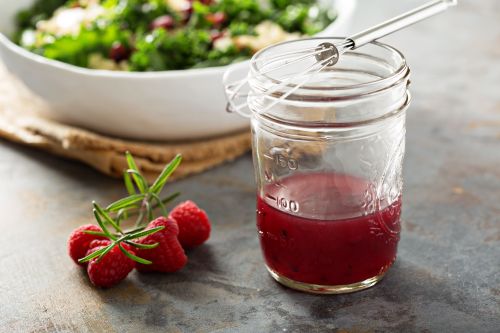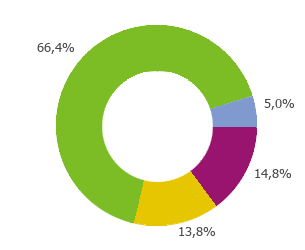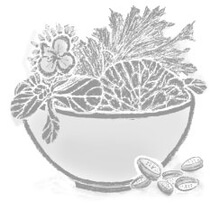ORGANIC Poppy seed oil
virgin


Non EU agriculture
- gently cold-pressed from organic blue poppy seeds
- fine taste and scent of poppy seeds
- ideal for salad dressings, desserts and baking
- vegan, lactose- and gluten-free
from 417 ratings

 Blue poppy
Blue poppyWe press our organic poppy seed oil fresh from the mill using freshly harvested blue poppy seeds from certified organic cultivation. The virgin cold pressing preserves the typical, slightly nutty taste. The valuable ingredients of the oil are also preserved, as it is not heated or refined during production. For example, poppy seed oil contains around 85 g per 100 g of unsaturated fatty acids, including linoleic acid. The human body cannot produce linoleic acid itself.
Valuable linoleic acid
Linoleic acid helps to maintain a normal blood cholesterol level. A positive effect is achieved with a daily intake of 10 g of linoleic acid, which corresponds to 15 g of oil (2 tablespoons of 8 g each). A varied and balanced diet and a healthy lifestyle should be observed.
For the cold kitchen
Poppy seed oil is characterized by its delicate, sweet aroma and is an edible oil for cold dishes. The light yellow oil full of character is ideal in dressings, fruit salads, muesli or desserts. It enhances the flavor of the ingredients and gives them a special touch. Poppy seed oil also ensures that the fat-soluble vitamins from the food used can be absorbed and utilized by the body. However, it should not be heated to high temperatures, as this changes its taste. Poppy seed oil goes particularly well with tomatoes, watermelon and potatoes, but it can also be used to refine pasta dishes - simply add a little poppy seed oil to the pasta after cooking. Desserts - for example ice cream, yeast dumplings or panna cotta - gain in flavor with a few drops of poppy seed oil. Due to its intense flavor, it is very economical - you only ever need a small amount of oil.
Poppy seed oil for skin care
Poppy seed oil is also used in cosmetics. You can also use our mill-fresh poppy seed oil for skin care. Simply apply to the skin or particularly dry areas of skin and you're done! Or you can add a small dash of poppy seed oil to your bath water. It goes without saying that poppy seed oil does not contain any opiates (morphine and codeine) and, of course, we at Ölmühle Solling only use poppy seeds from controlled organic cultivation to produce our poppy seed oil.
Usage
Organic poppy seed oil is ideal for exquisite fruit salads and raw food dishes. It also tastes good with muesli and fine desserts and is therefore very popular in wholefood cuisine.
Due to its high content of polyunsaturated fatty acids, poppy seed oil should not be used for frying. Poppy seed oil is also used for skin care.
Recipe

Grapefruit raspberry dressing
Fresh grapefruit raspberry dressing with fresh raspberries, grapefruit juice and raspberry vinegar. Poppy seed oil and honey balance the taste. Perfect for leaf and raw food salads. zum RezeptRatings
Specification and ingredients
Poppy seed oil
Average energy and nutrient content for 100 g
Please enjoy our products as part of a diverse and balanced nutrition.
As a product of nature the composition of the oil can vary, the given specifications are therefore average values.
Ingredients
Poppy seed oil, certified organicDurability
9 - 12 monthsLagerung
Store in a cool and dark place.Fatty acids diagram

Botanical name: Papaver somniferum L.
Origin:
Blue and gray poppies are cultivated in Turkey, India, Iran, the People's Republic of China and the CIS. The organically grown poppy seeds we use come from Turkey. Following an old tradition, poppies are currently being grown organically again on a trial basis in the Weserbergland (on the Ottenstein plateau). The first cultivation trials have been successful and we are optimistic that we will be able to source this prized oilseed from regional cultivation in the future.
Certification:
The poppy seeds used for our poppy seed oil come from controlled organic cultivation in accordance with BIO VO 834/2007 and VO 1235/2008.
Poppy seed oil is characterized by a high content of polyunsaturated fatty acids. It is therefore very sensitive to oxidation and not suitable for the preparation of hot dishes such as frying or braising.
Regulation (EC) No. 1924/2006 of the European Parliament restricts nutrition and health claims made on foods. This means that from December 12, 2012, it will no longer be possible to refer to the nutritional and physiological effects of foods and food supplements.
READING TIP: If you would like to find out more about vegetable oils, please refer to the following publications and websites:
- www.systemed.de
o Positive things about fats and oils ISBN 978-3-942772-57-0
- www.olionatura.de





 Hemp seed oil
Hemp seed oil Plum kernel oil
Plum kernel oil Chia oil
Chia oil Olive oil with bergamot
Olive oil with bergamot